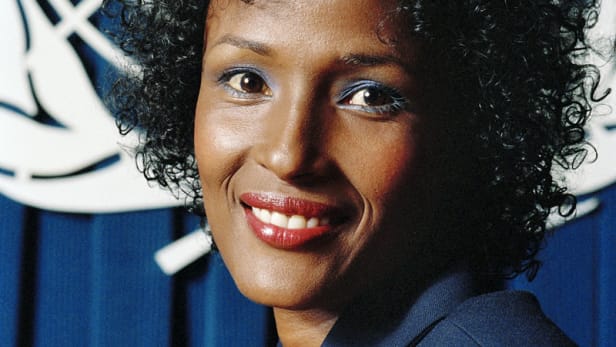By Jennifer Ehidiamen
 |
| Waris Dirie, the founder of Desert Flower Foundation. Photo by: Eskinder Debebe / United Nations |
Is ending Female Genital Mutilation, or FGM, perceived with the sense of urgency it deserves? Over 200 million girls and women have been affected by the practice in countries in Africa, the Middle East and Asia, where FGM is concentrated, according to UNICEF. But cultural complexities associated with the practice often push the issue to the backburner of the development agenda.
“FGM is a very sensitive topic,” says Waris Dirie, the founder of Desert Flower Foundation, a nonprofit dedicated to raising awareness and eradicating the FGM practice globally.
Somali-born Dirie, a former supermodel and actress turned human right activist, launched the Desert Flower Foundation in 2002 after the debut of the movie by the same name, which depicts her personal experience with FGM as a child. She has remained a well-known global advocate for the cause.
“When I first started talking about FGM, it wasn’t much of a topic to anyone," Dirie wrote of her motivation to start campaigning. "But by publishing my books and the movie ‘Desert Flower,’ I was able to raise awareness to a topic that wasn’t really discussed in our society.”
Dirie has now opened four Desert Flower Centers in Europe, where victims of FGM can receive psychological support and undergo reconstructive surgeries. The centers also provide education materials for individuals, civil society groups and academic institutions. The centers operate in Paris, Berlin, Stockholm and Amsterdam.
In addition, the foundation runs a sponsorship program called Save a Little Desert Flower. “We are protecting little girls in Sierra Leone and Djibouti from the cruel procedure and are supporting them financially, for them to attend school,” Dirie explained.
Asked how she thinks change will come for the many women affected, Dirie pointed to local engagement. “I think it needs personal commitment to eradicate it,” Dirie said in an email interview with Devex. Adding that “laws, education and direct work within communities” can help start the process of eliminating the practice.
To mark the International Day of Zero Tolerance for Female Genital Mutilation, Devex interviewed Dirie to learn more about her work and mission. Our conversation has been edited for length and clarity.
What is your reason for hope that FGM can be eradicated globally?
My hope in humanity! FGM is a cruel ritual and a human rights violation. I hope that by providing education and teaching people about the consequences of FGM, they will understand that FGM is not part of a tradition but a crime against humanity.
Some countries have put laws in place to ban FGM. Is this preventive measure enough to eradicate the practice?
A few countries have introduced laws against FGM, but unfortunately, those bans don’t mean the end of FGM. There are still people practicing FGM in countries where it’s banned, because the authorities don’t take action against perpetrators. Besides laws, it needs the willingness to act against this inhuman procedure. It needs a combination of laws and enlightenment, which can be done by working directly with the community.
What informed your decision to open the Desert Flower Centers in Europe, and what are some of the challenges currently limiting your efforts to expand to other regions?
When we did the first undercover research on FGM in Europe, we discovered that FGM wasn’t only a problem in Africa but also a big one in Europe. As our headquarters are situated in Europe, we thought it would be a good start to open up the centers here to see the progress first hand. Women from everywhere come to seek help. At the moment, there are four Desert Flower Centers in Europe, and we are planning to open more centers all over the world.
Since FGM unfortunately isn’t banned in every African country, it isn’t very easy to open up a center where you can carry out reconstructive surgery. There is still pressure on women and young girls coming from the community, which makes it hard for them to seek help. But together with our Desert Flower Foundation in Sierra Leone, we are working within the communities to change their views on this cruel procedure.
Every good cause always needs good funding. What can donors do differently to improve their support for organizations such as Desert Flower Foundation that are tackling such sensitive issues as FGM?
FGM is a very sensitive topic, and I think it needs personal commitment to eradicate it. With FGM it’s different; it is not enough to just donate money. It is important to raise awareness. By talking about FGM, our goal is to change people’s thinking. We have many supporters who already understand our commitment and organize fundraising events in the name of the Desert Flower Foundation. They participate in marathons or organize lectures at their universities or schools.
What would be your advice to NGOs working to tackle this issue but struggling with funding or sustainability?
Invest in long-term projects. We have several projects, such as our sponsorship program, educational program and medical treatment, which rely on long-term donations. Thinking on a long-term basis makes it easier to evaluate new strategies and [build] a stable financial model. There are many different ways to make funding more sustainable, dependent on what kind of charity project you are involved in. I think times are changing, and NGOs need to become more independent, which calls for new financial models.

No comments:
Post a Comment